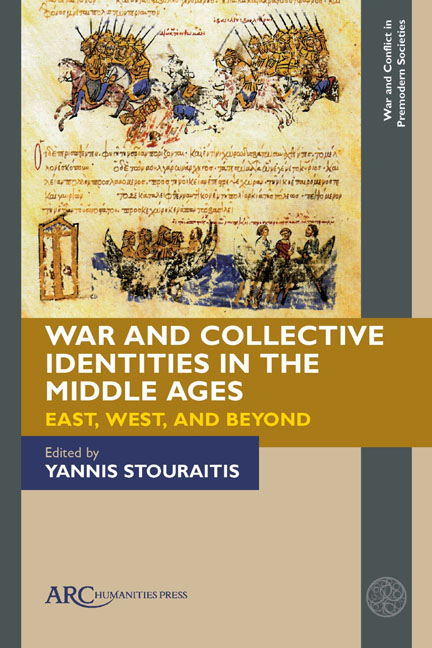Book contents
- Frontmatter
- Contents
- Notes on Contributors
- Chapter 1 War and Peoplehood in the Middle Ages: An Introduction
- Chapter 2 War and Peoplehood through Time: A Sociological Longue Durée Perspective
- Chapter 3 Making War Ethnic: Arab– Persian Identities and Conflict on the Euphrates Frontier
- Chapter 4 Captive Identities: Inscribing Armenianness from Sebēos to Ayrivanec‘i
- Chapter 5 War and Identity in Early Medieval Bulgaria
- Chapter 6 Collective Identifications in Byzantine Civil Wars
- Chapter 7 Warfare and Peoplehood: The Vikings and the English
- Chapter 8 Medieval European Civil Wars: Local and Proto-national Identities of Toulousains, Parisians, and Prague Czechs
- Chapter 9 The Crusades and French Political Identity in the Thirteenth-Century Mediterranean
- Chapter 10 The Song– Jurchen Conflict in Chinese Intellectual History
- Chapter 11 Faithful to a Vanishing Past: Narrating Warfare and Peoplehood in Yuan China
- Chapter 12 War and Collective Identifications in Medieval Societies: Drawing Comparisons
- Selected Bibliography
- Index
Chapter 6 - Collective Identifications in Byzantine Civil Wars
Published online by Cambridge University Press: 28 December 2023
- Frontmatter
- Contents
- Notes on Contributors
- Chapter 1 War and Peoplehood in the Middle Ages: An Introduction
- Chapter 2 War and Peoplehood through Time: A Sociological Longue Durée Perspective
- Chapter 3 Making War Ethnic: Arab– Persian Identities and Conflict on the Euphrates Frontier
- Chapter 4 Captive Identities: Inscribing Armenianness from Sebēos to Ayrivanec‘i
- Chapter 5 War and Identity in Early Medieval Bulgaria
- Chapter 6 Collective Identifications in Byzantine Civil Wars
- Chapter 7 Warfare and Peoplehood: The Vikings and the English
- Chapter 8 Medieval European Civil Wars: Local and Proto-national Identities of Toulousains, Parisians, and Prague Czechs
- Chapter 9 The Crusades and French Political Identity in the Thirteenth-Century Mediterranean
- Chapter 10 The Song– Jurchen Conflict in Chinese Intellectual History
- Chapter 11 Faithful to a Vanishing Past: Narrating Warfare and Peoplehood in Yuan China
- Chapter 12 War and Collective Identifications in Medieval Societies: Drawing Comparisons
- Selected Bibliography
- Index
Summary
THE RELATIONSHIP BETWEEN warfare and identity formation in the medieval East Roman Empire, known under the terminus technicus Byzantine Empire, is a relatively understudied topic. In this chapter, I intend to explore collective identification as this emerged from and was conceptualized in Byzantine accounts of civil wars in the period from the seventh century onwards. This is the period when the imperial state of Constantinople was ultimately confined territorially to the eastern Mediterranean and its elite culture ceased to be divided between Latin and Greek as had been the case in the Roman Empire of late antiquity. After the seventh century, the merging of Hellenic cultural elements with the Roman political culture gave birth to a hybrid, non-Latin Roman identity which has become an object of revisionist research in roughly the last decade.
In my latest contributions to the topic, I have tried to show that the exploration of Byzantine Romanness needs to break free from a rigid methodological framework which, based on a cherry-picking approach to the evidence of the sources, seeks to reveal or rather to reconstruct an East Roman ethnonational identity that was allegedly shared by the majority within that social order. Such approaches depart from a rather superficial constructivism which tends to reify ethnicity, arbitrarily turning the latter into the basis for political loyalty. Consequently, they tend to ignore or misrepresent three important issues: first, the boundaries of the East Roman political community were not imagined as delimited in cultural-territorial terms. Second, ethnicity or indigeneity were not the principal criteria for full membership in the Roman political order. Third, the Greek-speaking Romans did not perceive themselves as a natural community of descent, the narratives about the community's historical origins being malleable, something which is interrelated with the changing content and the situational nature of Roman ethno-cultural discourses over the centuries.
In this light, collective attachments in the East Roman political community were determined by the idea of a hierarchical political order circumscribed by the fluctuating limits of enforceable authority of the Roman emperor of Constantinople.
- Type
- Chapter
- Information
- War and Collective Identities in the Middle AgesEast, West, and Beyond, pp. 99 - 116Publisher: Amsterdam University PressPrint publication year: 2023

